Hyundai Kona vs Toyota Proace City – Differences & prices compared
Compare performance, boot space, consumption and price in one view.
Find out now: which car is the better choice for you – Hyundai Kona or Toyota Proace City?
The Hyundai Kona (SUV) comes with a Petrol, Full Hybrid or Electric engine and Manuel or Automatic transmission. In comparison, the Toyota Proace City (High Roof Estate) features a Petrol, Diesel or Electric engine with Manuel or Automatic transmission.
When it comes to boot capacity, the Hyundai Kona offers 466 L, while the Toyota Proace City provides 912 L – depending on how much space you need. If you’re looking for more power, decide whether the 218 HP of the Hyundai Kona or the 136 HP of the Toyota Proace City suits your needs better.
In terms of consumption, the values are 14.60 kWh4.50 L per 100 km for the Hyundai Kona, and 18.10 kWh5.30 L for the Toyota Proace City.
Price-wise, the Hyundai Kona starts at 23100 £, while the Toyota Proace City is available from 20800 £. Compare all the details and find out which model fits your lifestyle best!
Hyundai Kona
The Hyundai Kona blends a bold design with a versatile interior, making it a standout choice in the compact SUV market. Its crisp handling and responsive steering provide an engaging driving experience, whether in the city or on the open road. The vehicle also offers a range of features designed to enhance comfort and connectivity, ensuring a pleasurable journey for both driver and passengers.
details @ hyundai.news
@ hyundai.news
 @ hyundai.news
@ hyundai.news
 @ hyundai.news
@ hyundai.news
 @ hyundai.news
@ hyundai.news
Toyota Proace City
The Toyota Proace City High Roof Combi is designed to seamlessly blend practicality with comfort, making it an ideal choice for families and businesses alike. Its versatile interior allows for flexible seating and cargo arrangements, catering to a variety of transport needs. Equipped with modern technology and advanced safety features, this vehicle ensures a reliable and secure driving experience.
details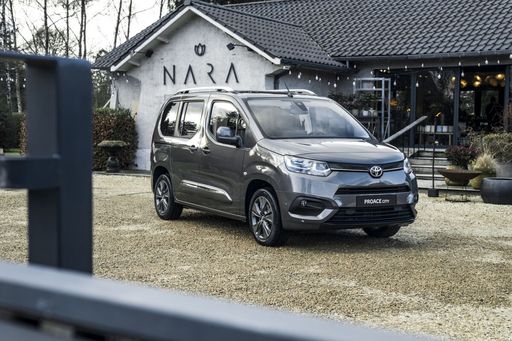 @ Toyota Deutschland
@ Toyota Deutschland
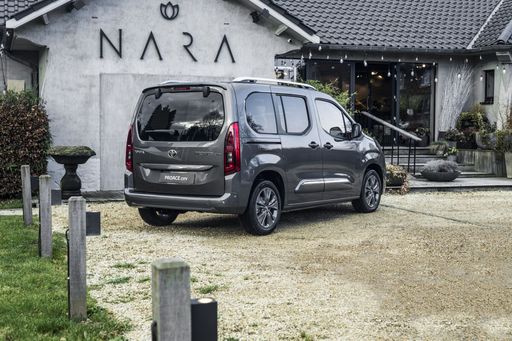 @ Toyota Deutschland
@ Toyota Deutschland
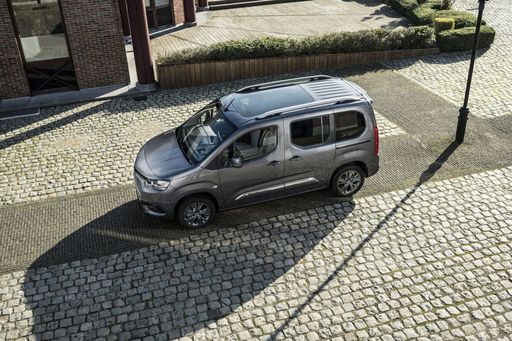 @ Toyota Deutschland
@ Toyota Deutschland
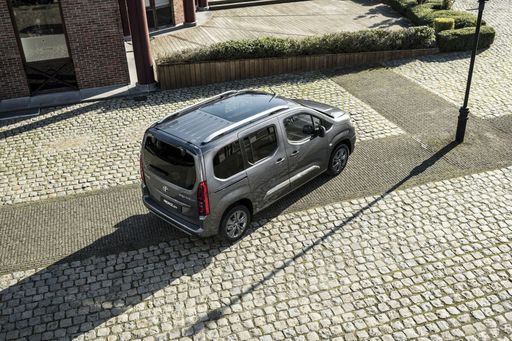 @ Toyota Deutschland
@ Toyota Deutschland
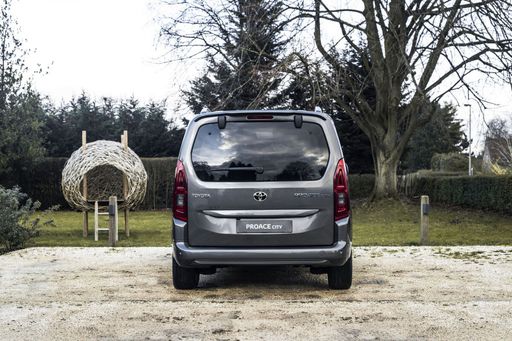 @ Toyota Deutschland
@ Toyota Deutschland
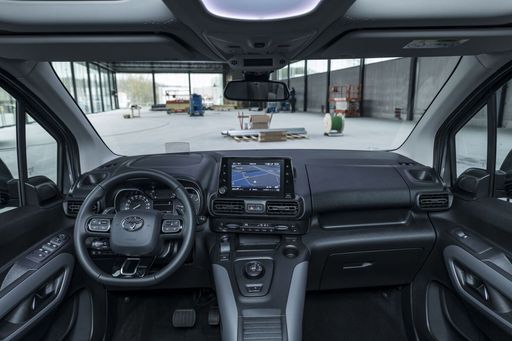 @ Toyota Deutschland
@ Toyota Deutschland

|

|
|
|
|
Costs and Consumption |
|
|---|---|
|
Price
23100 - 41600 £
|
Price
20800 - 42100 £
|
|
Consumption L/100km
4.5 - 6.9 L
|
Consumption L/100km
5.3 - 6.3 L
|
|
Consumption kWh/100km
14.6 - 16.8 kWh
|
Consumption kWh/100km
18.10 kWh
|
|
Electric Range
377 - 514 km
|
Electric Range
343 km
|
|
Battery Capacity
1.3 - 65.4 kWh
|
Battery Capacity
-
|
|
co2
0 - 157 g/km
|
co2
0 - 146 g/km
|
|
Fuel tank capacity
38 - 47 L
|
Fuel tank capacity
50 - 61 L
|
Dimensions and Body |
|
|---|---|
|
Body Type
SUV
|
Body Type
High Roof Estate
|
|
Seats
5
|
Seats
5 - 7
|
|
Doors
5
|
Doors
4 - 5
|
|
Curb weight
1370 - 1773 kg
|
Curb weight
1366 - 1664 kg
|
|
Trunk capacity
466 L
|
Trunk capacity
322 - 912 L
|
|
Length
4350 - 4385 mm
|
Length
4401 - 4751 mm
|
|
Width
1825 mm
|
Width
1848 mm
|
|
Height
1580 - 1585 mm
|
Height
1812 - 1818 mm
|
|
Payload
420 - 490 kg
|
Payload
525 - 869 kg
|
Engine and Performance |
|
|---|---|
|
Engine Type
Petrol, Full Hybrid, Electric
|
Engine Type
Petrol, Diesel, Electric
|
|
Transmission
Manuel, Automatic
|
Transmission
Manuel, Automatic
|
|
Transmission Detail
Manual Gearbox, Dual-Clutch Automatic
|
Transmission Detail
Manual Gearbox, Automatic Gearbox
|
|
Drive Type
Front-Wheel Drive, All-Wheel Drive
|
Drive Type
Front-Wheel Drive
|
|
Power HP
100 - 218 HP
|
Power HP
102 - 136 HP
|
|
Acceleration 0-100km/h
7.8 - 13.3 s
|
Acceleration 0-100km/h
11.5 - 13.2 s
|
|
Max Speed
162 - 208 km/h
|
Max Speed
135 - 186 km/h
|
|
Torque
200 - 265 Nm
|
Torque
205 - 300 Nm
|
|
Number of Cylinders
3 - 4
|
Number of Cylinders
3 - 4
|
|
Power kW
74 - 160 kW
|
Power kW
75 - 100 kW
|
|
Engine capacity
998 - 1598 cm3
|
Engine capacity
1199 - 1499 cm3
|
General |
|
|---|---|
|
Model Year
2024
|
Model Year
2024 - 2025
|
|
CO2 Efficiency Class
D, C, E, F, A
|
CO2 Efficiency Class
E, A
|
|
Brand
Hyundai
|
Brand
Toyota
|
Hyundai Kona
The Hyundai Kona: A Comprehensive Overview
The Hyundai Kona has established itself as a standout in the compact SUV segment, blending innovation with performance and style. As the automotive world moves towards more sustainable and efficient options, the Kona offers a variety of powertrains, from traditional petrol engines to full hybrids and all-electric models.
Powertrain Options and Performance
The Hyundai Kona's powertrain choices cater to a wide range of preferences. For petrol enthusiasts, the Kona offers a 1.0L T-GDI engine, delivering 100 PS, and a more robust 1.6L T-GDI variant with up to 170 PS. Those looking for efficiency without sacrificing power can consider the full hybrid model, offering 129 PS and an impressive consumption of 4.5 L/100km.
For a greener option, the all-electric Kona provides a compelling case. With battery capacities of up to 65.4 kWh, the electric Kona offers power outputs of 156 to 218 PS, and efficiencies as low as 14.6 kWh/100km, enabling an electric range of up to 513 km.
Technical Specifications and Innovations
Built on a robust platform, the Kona delivers versatility and reliability. With a choice between manual or dual-clutch automatic gearboxes, along with options for front-wheel or all-wheel drive, the Kona ensures a tailored driving experience. The handling is enhanced by the car's lightweight construction, balancing a 1370 to 1773 kg curb weight with dynamic performance.
The Kona's design doesn't compromise cargo space for style; it offers a generous 466 L boot capacity. With a relatively compact body, measuring 4350 to 4385 mm in length, the Kona easily navigates urban environments while still commanding a strong road presence with its 1825 mm width.
Efficiency and Eco-Friendliness
Hyundai is committed to reducing emissions, as evidenced by the Kona's CO2 efficiency ratings, which range from class A for electric models to class D for some higher-performance petrol variants. The focus on reducing environmental impact without sacrificing driving pleasure is notable throughout the Kona range.
Costing and Value
The Hyundai Kona offers commendable value for money. Pricing starts at €26,400 and reaches up to €50,690, depending on the chosen configuration. The monthly running costs range from €956 to €1090, with a cost per kilometre of 38.3 to 43.6 cents, making it a competitive option in its class.
Conclusion: Modern, Efficient, and Versatile
The Hyundai Kona stands as a testament to Hyundai's commitment to innovation, efficiency, and practicality. Whether you are inclined towards a traditional combustion engine, a hybrid for a balance of power and efficiency, or a full electric model for maximum eco-friendliness, the Kona provides a tailored solution for each unique driver preference.
Toyota Proace City
The Versatile Toyota Proace City: A Gamechanger in the Van Segment
In the bustling world of automotive innovations, the Toyota Proace City stands out as a versatile, high-roof van that combines practicality with cutting-edge technology. Designed to cater to the needs of businesses and families alike, the Proace City makes a compelling case for itself with various powertrain options, impressive load capacity, and modern amenities. Let’s dive into the technical details and innovations that make this model a standout choice.
Powertrain Variety: Meeting Diverse Needs
The Toyota Proace City offers a diverse range of powertrains to meet different driving needs and preferences. Whether you're looking for the traditional power of internal combustion engines or the modern efficiency of electric propulsion, the Proace City has got you covered. The petrol options include a 1.2 Turbo engine, producing 110 PS with a consumption rate of 6.3 L/100km. For diesel enthusiasts, a robust 1.5 D-4D Diesel engine is available, offering power outputs up to 130 PS and a consumption as low as 5.3 L/100km. Moreover, the electric versions pack a 50 kWh battery that delivers 136 PS with an efficient consumption rate of 19.4 kWh/100km, providing an impressive range of up to 284 km.
Technological Advancements and Efficiency
Innovation in the Toyota Proace City extends beyond its engines. It boasts an impressive array of technologies aimed at enhancing efficiency and safety. The CO2 efficiency classes range from A to E depending on the model, with emissions that meet Euro 6 standards, reflecting Toyota’s commitment to sustainability. The integration of various automatic and manual transmission options provides drivers with flexibility and control, ensuring a smooth and efficient driving experience.
Comfort and Practicality: Inside the Proace City
Step inside the Toyota Proace City, and you are greeted with a spacious and well-appointed interior. Depending on the configuration, the van offers seating for five to seven passengers, making it ideal for both family use and commercial applications. The boot capacity ranges from 322 to 912 litres, ensuring ample space for all your cargo needs. With maximum payloads of up to 869 kg, the Proace City is designed to handle heavy-duty tasks without compromising on passenger comfort.
A Design for Every Purpose
The Toyota Proace City spans a length between 4401 mm and 4751 mm, providing a substantial yet manageable vehicle size. The consistent width of 1848 mm and height reaching up to 1818 mm offer a solid road presence while ensuring maneuverability in urban settings. The notable variant selection includes designations like Club, Comfort, Flow, and Team Deutschland, each with optional automatic configurations to match different lifestyle and business demands.
Affordability and Operational Costs
With a starting price range from €24,835 to €51,245, the Toyota Proace City provides an accessible entry into the segment of high-roof vans. Its economical efficiency extends to operational costs, with monthly expenses ranging from €1,071 to €1,181, showcasing financial viability for both private owners and fleet operators alike.
Conclusion
The Toyota Proace City stands as a formidable contender in the van market, offering a blend of flexibility, efficiency, and modern technology. Its range of powertrains, spacious interior, and low operating costs make it a practical choice for anyone from urban professionals to family adventurers. Whether it's for work or leisure, the Proace City proves that a utility vehicle can be both functional and sophisticated.
The prices and data displayed are estimates based on German list prices and may vary by country. This information is not legally binding.
